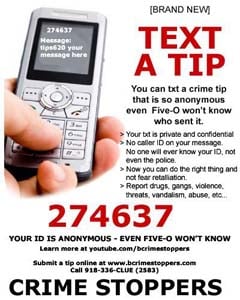Text-a-Tip Programs Catch On, Help Police Solve Crimes
For years, police have struggled with an anti-snitching culture that has made witnesses afraid to come forward with information that could help solve a crime. Now, police from across the country are getting help from anonymous text messages sent to text-a-tip programs throughout the country.
Boston is one of the first cities in the country to heavily promote sending text messages to help solve crimes. Thus far, police in Boston have received more than 1,000 tips since the program began two years ago. Some of these tips have been helpful in finding key leads in at least four high-profile killings including the accidental shooting of a young boy by his cousin, an arson fire that killed two children, the shooting of a Boston teenager on her birthday, and the fatal stabbing of a man during a bar fight. An anonymous text also helped authorizes in Douglas County, Colo. thwart a potential Columbine-style attack after an anonymous text was received about a student's kill list, which led police to weapons in the child's home.

Officer Michael Charbonnier, who oversees the text-a-tip program in Boston, said people who live in high-crime neighborhoods are often afraid to talk to police due to fear of repercussions such as being hurt or killed by criminals.
"It's either call 911 or live with the bad guy. And if you call, there could be repercussions," Charbonnier said. "So when they have this option of texting us — knowing no one will know who they are — well, now, people give us license plate numbers, they give us names."
With the anonymous texting programs, police never see the tipster's name or telephone number because the tips are sent to a separate, third-party server where all identifying information is stripped out. An encrypted alias is then assigned to the tip before it is sent to police. Using this encrypted alias, police are able to send text messages back to the tipster to ask follow-up questions if necessary.
According to Charbonnier, the police promise tipsters confidentiality and anonymity. In honoring that promise, they have never tried to get a tipster's identity from the third-party company, either by asking for it or through a subpoena. Citing the confidentiality they promise tipsters, police would not release transcripts of the actual text messages they have received or give specifics relating to how the tips have led them to suspects.
Although it's hard to pinpoint how many texting programs are available around the country, they're definitely gaining in popularity. As one of the leading providers of technology for text-a-tip programs, Anderson Software has at least 400 law enforcement agencies as clients.
Boston is one of the first cities in the country to heavily promote sending text messages to help solve crimes. Thus far, police in Boston have received more than 1,000 tips since the program began two years ago. Some of these tips have been helpful in finding key leads in at least four high-profile killings including the accidental shooting of a young boy by his cousin, an arson fire that killed two children, the shooting of a Boston teenager on her birthday, and the fatal stabbing of a man during a bar fight. An anonymous text also helped authorizes in Douglas County, Colo. thwart a potential Columbine-style attack after an anonymous text was received about a student's kill list, which led police to weapons in the child's home.

Officer Michael Charbonnier, who oversees the text-a-tip program in Boston, said people who live in high-crime neighborhoods are often afraid to talk to police due to fear of repercussions such as being hurt or killed by criminals.
"It's either call 911 or live with the bad guy. And if you call, there could be repercussions," Charbonnier said. "So when they have this option of texting us — knowing no one will know who they are — well, now, people give us license plate numbers, they give us names."
With the anonymous texting programs, police never see the tipster's name or telephone number because the tips are sent to a separate, third-party server where all identifying information is stripped out. An encrypted alias is then assigned to the tip before it is sent to police. Using this encrypted alias, police are able to send text messages back to the tipster to ask follow-up questions if necessary.
According to Charbonnier, the police promise tipsters confidentiality and anonymity. In honoring that promise, they have never tried to get a tipster's identity from the third-party company, either by asking for it or through a subpoena. Citing the confidentiality they promise tipsters, police would not release transcripts of the actual text messages they have received or give specifics relating to how the tips have led them to suspects.
Although it's hard to pinpoint how many texting programs are available around the country, they're definitely gaining in popularity. As one of the leading providers of technology for text-a-tip programs, Anderson Software has at least 400 law enforcement agencies as clients.

